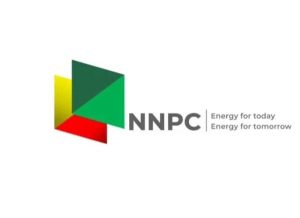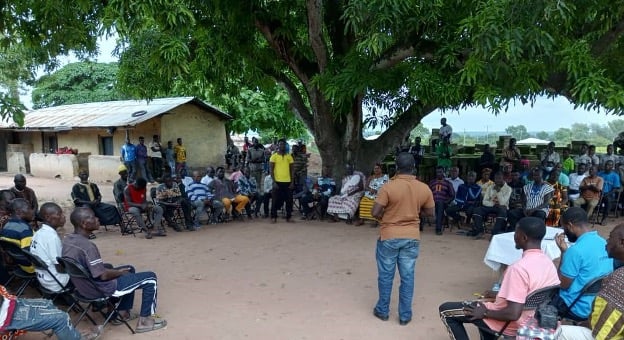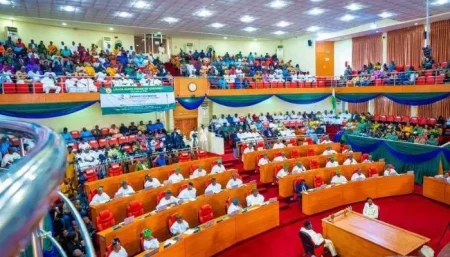The Atebubu-Amantin municipal office of the Department of Agriculture embarked on a sensitization campaign in the communities of Akokoa, Kumfia, and Abamba to educate residents about the government’s flagship agricultural program, “Planting for Food and Jobs – Feed Ghana.” This initiative aims to bolster food production in Ghana, targeting both domestic consumption and export markets, thereby contributing significantly to national food security. The program focuses on increasing the production of staple crops such as maize, rice, sorghum, soya beans, cassava, yam, and potato. It also encompasses vegetable cultivation, specifically tomatoes, pepper, and onions, and seeks to enhance livestock production, including goats, sheep, cattle, pigs, and poultry. Furthermore, the “Feed Ghana” program supports the cultivation of tree crops like mango, cashew, coconut, oil palm, and shea nut.
The government has committed to providing essential resources to participating farmers, including high-quality planting and breeding materials, tractor services, and various agricultural inputs. These resources will be offered at an agreed-upon cost, which beneficiaries are expected to repay in kind using produce from their farms at a predetermined date. This innovative repayment system ensures the sustainability of the program and allows for its expansion to benefit a greater number of farmers. The municipal agricultural director, Mr. Bright Atta Boateng, urged beneficiaries to uphold honesty and integrity in their dealings with the authorities to guarantee the long-term success of the program and ensure its accessibility to future generations of farmers.
The “Feed Ghana” program presents a remarkable opportunity for farmers in the Atebubu-Amantin municipality, particularly with the planned establishment of Farmer Service Centers in the area. These centers will provide a centralized hub for agricultural support services, enhancing accessibility to resources and information. By leveraging the opportunities presented by the program, farmers can significantly boost their agricultural output, leading to increased incomes and improved livelihoods. The program’s emphasis on collaboration and group formation further strengthens its potential for positive impact.
To participate in the “Feed Ghana” program, farmers are required to organize themselves into groups of 15 to 40 members. This group structure is a key prerequisite for accessing the various forms of assistance offered under the initiative. Existing groups with more than forty members are not excluded, suggesting an adaptable approach to accommodate established farming collectives. This approach encourages community involvement and facilitates the efficient distribution of resources and support.
During the sensitization campaign, Mr. Atta Boateng and his team addressed various concerns raised by the farmers. The interactive sessions provided a platform for open communication and clarification of program modalities. While the farmers generally expressed enthusiasm for the initiative, some voiced concerns based on past experiences with similar programs. They highlighted instances where beneficiaries failed to repay the provided assistance, leading to the eventual collapse of such initiatives. This underscores the importance of emphasizing the reciprocal nature of the “Feed Ghana” program and ensuring accountability among participants.
The “Feed Ghana” program holds immense potential for transforming the agricultural landscape in the Atebubu-Amantin municipality and beyond. By focusing on key crops, livestock, and tree crops, the initiative aims to achieve food security, boost agricultural exports, and improve the livelihoods of farmers. The government’s commitment to providing essential resources, coupled with the planned establishment of Farmer Service Centers, further strengthens the program’s potential for success. However, ensuring the program’s long-term sustainability requires the active participation and honest dealings of beneficiary farmers, as well as effective monitoring and management by the responsible authorities. Learning from the pitfalls of past agricultural initiatives will be crucial for ensuring the success and longevity of the “Feed Ghana” program. The program’s focus on community-based group formation offers a promising approach to fostering collaboration, resource sharing, and collective responsibility, ultimately contributing to a more robust and resilient agricultural sector in Ghana.














